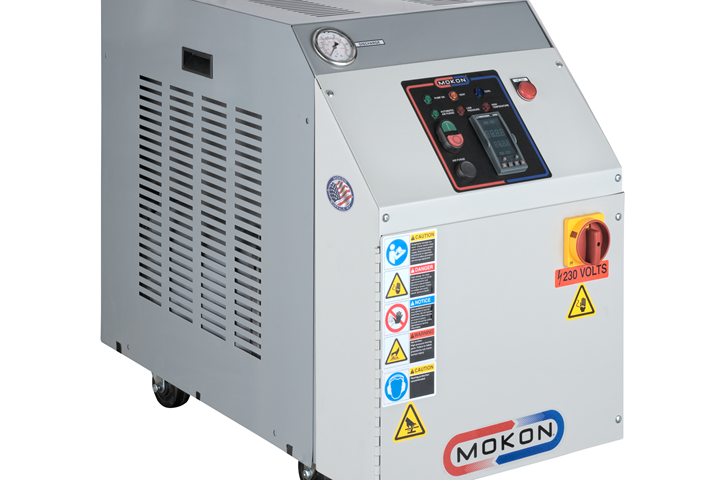Heat Transfer Line Expanded
Mokon has extended its HTF Series of oil-based heat-transfer-fluid systems to include the HTF 400 Series, providing fluid temperatures up to 400F.
Liquid temperature control system manufacturer Mokon (Buffalo, N.Y.) has expanded its line of Heat Transfer Fluid (HTF) systems, adding the HTF 400 Series. Mokon says this newest addition, which joins the HTF 500 and 600 Series, will provide customers a higher temperature range for lower-end process requirements.
There are 10 models in the HTF 400 Series, ranging in horsepower, flow rate and heating capacity from 1/3 hp, 5 gpm and 3 kW to ¾ hp, 10 gpm and 24 kW. All units feature one heating zone and up to 60 psi pressure. The HTF 400 Series’ approximate footprint goes from 32 by 17 by 27 (length by width by height) to 33 by 17 by 52.
Mokon says the HTF 400’s small footprint and design are well suited for process applications where space is limited and continuous temperature control is required. The unit provides temperatures up to 400F (204C). It features a high-efficiency gear pump, microprocessor-based controller and UL 508A certified electrical sub panel. Mokon notes that custom designs, options, international certifications and accessories are available. Mokon’s HTF 500 Series heat transfer fluid system offers temperatures from 125 to 500 F (52 to 260 C), while the HTF 600 Series operates from 125 to 600 F (52 to 315 C).

Mokon’s HTF 400 Series of oil-based heat-transfer-fluid systems provide fluid temperatures up to 400F.
Photo Credit: Mokon
Related Content
-
Water Temperature Control Upgraded and Integrated into Machine Control
Engel’s new eco-flomo temperature control system continuously monitors injection mold cooling and temperature control circuits, displaying pressure, temperature and flow rate values.
-
Thermal Care Names New Regional Manager
The process-cooling technology supplier has appointed Avi Bromberg to manage equipment sales and support in the Mid鈥怉tlantic, New England, Eastern Canada and the Caribbean.
-
Mold Sensor Prevents Accidental Closure in Injection Molds
When tied to the machine control, Burger & Brown Engineering’s Global Thinswitch can help prevent mold crashes due to premature mold close, saving the user downtime and expensive mold repairs.
